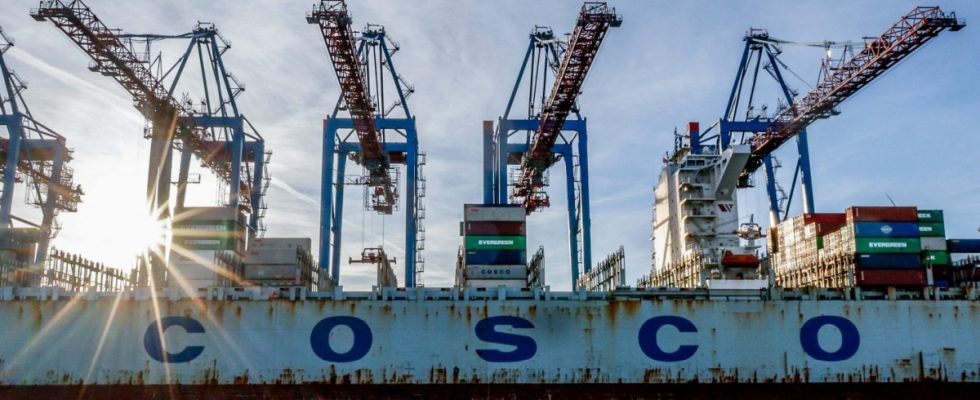The Chinese state-owned company Cosco is allowed to acquire 24.99 percent of the shares in the Hamburg container terminal in Tollerort as recently planned. This was announced by the spokesman for the federal government, Steffen Hebestreit.
Cosco originally wanted to take over 35 percent of the operating company of Container Terminal Tollerort GmbH and, in return, upgrade the terminal to become the preferred transshipment point in Europe. However, a fierce political dispute broke out in the federal government over the question of whether Chinese participation should be allowed. Last October, the cabinet decided on a so-called partial ban, which only allows the acquisition of less than 25 percent of Cosco shares. Any further acquisition above this threshold was prohibited.
As SZ, NDR and WDR reported in April, even the reduced participation was on the brink of late. The Federal Office for Security and Information Technology (BSI), which is part of the Federal Ministry of the Interior, surprisingly came to the conclusion that the Tollerort terminal is a critical infrastructure, i.e. it is considered particularly worthy of protection. That was a reversal compared to the previously known assessments.
The spokesman for the federal government indirectly addressed the risk assessment in his statement on the current decision. The container terminal in Tollerort is now considered an “operator of critical infrastructure in accordance with legal requirements”. Spokesman Hebestreit continued: “The cabinet decision of October 31, 2022, which limited the sale to less than 25 percent, will not be changed. The partial ban from autumn 2022 remains legally valid.”
“All questions relating to the investment review process could be clarified together in intensive, constructive discussions,” emphasized Hamburger Hafen und Logistik AG (HHLA). According to its own statements, the federal government confirmed in a letter “that the revised purchase contracts are in line with the conditions of the partial ban”.
HHLA can now expand the terminal into a preferred transhipment point for long-standing HHLA customer Cosco, where cargo flows between Asia and Europe are concentrated, HHLA explained. According to HHLA, China is currently the largest trading partner of Germany and the Port of Hamburg. Around 30 percent of the goods handled in the port of Hamburg come from or go to China. The minority stake secures employment and strengthens Hamburg’s national and international importance as a logistics location as well as the industrial nation of Germany. A total of around 1.35 million jobs in Germany depend on the ports.
Scholz against Green Ministers
Can China be allowed to invest in critical infrastructure in Germany? This issue sparked a government dispute in October. Federal Minister of Economics Robert Habeck (Greens) had criticized the deal shortly before it was completed, warning of new dependencies. Likewise, Foreign Minister Annalena Baerbock, but Chancellor Olaf Scholz (SPD) wanted to push it through – against the vote of six ministries.
As the former mayor of Hamburg, Scholz knows what the port wants and needs, which has recently fallen behind in the competition with Antwerp and Rotterdam. HHLA therefore wants to sell Cosco a minority stake in the smallest of the four Hamburg terminals – and, conversely, secure cargo from China.
According to research by SZ, NDR and WDR, there have been difficulties in the exchange of information between BSI and HHLA in the past, which made it difficult to assess the container terminal. In Berlin government circles, this apparently caused displeasure last year.

